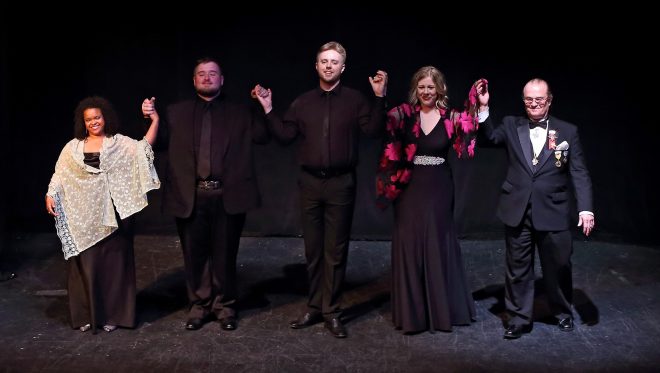
The Czarevitch (Der Zarewitsch) by Franz Lehár. Concert Operetta Theater, Philadelphia, May 2018.
Franz Lehár is one of the most famous musical theater composers of all time. His shows were popular in opera houses and on Broadway, and Lehár’s The Merry Widow is in the current repertoire of the Metropolitan Opera.
But his other works have been ignored in recent decades. So bravo to Concert Operetta Theater for bringing back this interesting example of Lehár’s art. This presentation was a rare treat, and it demonstrates the immense service provided by the company.
Lehár’s operetta The Czarevitch (Der Zarewitsch) is a sentimental reminder of a world which once was and, simultaneously, a tantalizing glimpse at what could have been.
Firstly, it’s filled with hummable melodies that evoke nostalgia for the days of European monarchies. This type of light opera dominated stages from Vienna to Broadway from the 1880s ’til the 1940s. Even though they’d fled from such monarchies, many immigrant Americans loved seeing these sugar-coated visions of royal life in their old countries. (Oddly, Lehar wrote The Czarevitch in 1927, nine years after the last czar had been deposed.)
Secondly, The Czarevitch shows Lehár flirting with a subject that was provocative — even scandalous. If he hadn’t backed off, this could have been a theatrical breakthrough.
In the plot, the son of Russia’s Czar Peter the Great resists all attempts to arrange a marriage for him. He turns away beautiful women who try to seduce him. Finally the heroine, Sonja, gets access to him dressed as a boy and they hug each other. When he finds out she’s a woman, he recoils. The couple pretends (to their friends) that they had sex, when in fact they did not. Could it be that the heir to the throne is gay? The homosexual angle adds tension, but Lehár ducks the question and the libretto shifts towards a conventional ending.
The remainder of the plot unfolds with the humor and sentimentality that Lehár is known for. He tends to rely on safe formulae and to avoid risks — musically and dramatically, as illustrated here. Still, his music brings smiles to your face and is well worth hearing. And this operetta is especially worthy because of the unusual plot which I’ve described.
A third attraction is the fact that The Czarevitch was written especially for Richard Tauber, one of the great tenors of the twentieth century. Lehár wrote a series of operettas for Tauber between 1925 and 1934, and the famous aria “Dein ist mein ganzes Herz” (“Yours Is My Heart Alone”). In this production we were able to hear a half dozen showpieces of romantic singing, including a melancholy Slavic-sounding lament, “The Volga Song.”
Andrew McGowan sang the title role in this concert-style production. He’s appealingly young, with a sweet voice. Soprano Katie Erikson played Sonja, very engaging in her lyric passages but incurring some pitch problems when singing loudly. Andrew Shaw was charismatic as the Czarevitch’s valet, Ivan. He has a ringing baritone voice and excellent comic delivery. His scenes with soprano Christine Chenes (playing his wife) were hilarious. James Longacre gave a sturdy presentation of the Czarevitch’s adviser, the Grand Duke.
José Meléndez, music director and superb pianist, deserves extra credit for coaching these young singers in the period style. The performers were in costume but there was no scenery on the stage of the Helen Corning Warden Theater at the Academy of Vocal Arts, 1920 Spruce Street in Philadelphia.
Artistic Director Daniel Pantano has multiple objectives for his company: to introduce new listeners to this genre; to re-acquaint old fans; and to expose young professional singers to the repertoire so they can pass it along to the next generation. While most light operas have been from central Europe, Concert Operetta Theater broadened its reach by producing a Spanish-language zarzuela last year and is preparing a Yiddish operetta by Boris Thomashevsky for next year.
Get more information by clicking here.
For discussion of another production that involves gender-bending, please click Fun Home here.